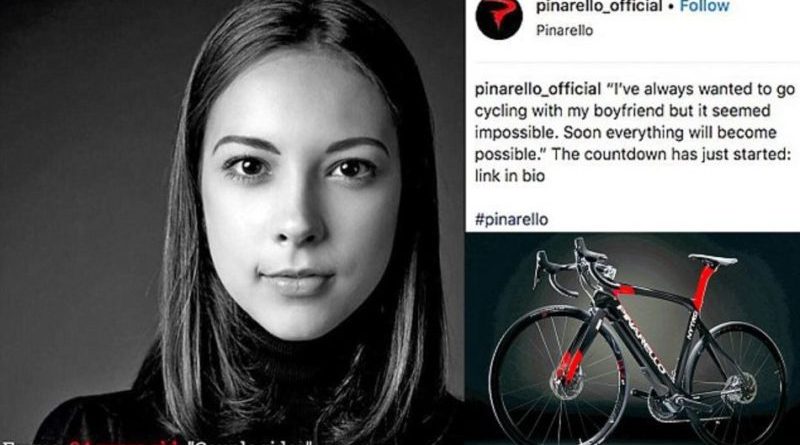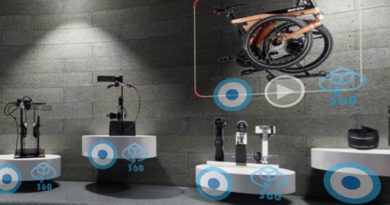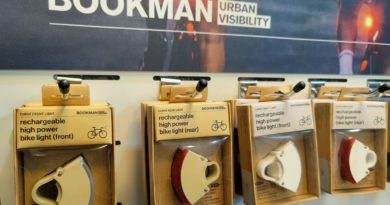Comment: Pinarello’s sexist ad might be the worst thing to hit the industry in years. Or the best.
By Rick Vosper, Industry Gadfly
Last week’s imbroglio over Pinarello’s spectacularly tone-deaf ad/press release for its new Nytro e-bike hit the industry like a ‘Cross rider stepping on a cow flop before the first runup. The result is distasteful. It’s embarrassing. It sticks to everything you touch, and the smell follows you everywhere you go—and for a very long time afterwards.
This is not a good thing for an industry desperately in need of increased ridership among that crucial 51% of the population that is female…or among the remaining 49%, either.
The ad tactlessly suggests women buy a Nytro in order to keep up with their boyfriends. A similar ad targeting men delivers a completely different message, this one about not having enough training time. The ad and accompanying press release were published in industry media on both sides of the Atlantic, notably in Bicycle Retailer here in the USA.
I called an old friend, Selene Yeager of Bicycling. She does the FitChick column there as well as other fitness, product and nutrition features. I found her coverage of the multistage Pinarello dumpster fire cool-headed and evenhanded. Much like Selene herself.
But when I asked her for a personal response to the ad as a woman and a cyclist, things heated up immediately.
“I saw the ad, and especially the Instagram campaign built around it and it made my head explode,” she told me. “But the thing about Pinarello—and I have a Pinarello—is that they have traditionally not reached out to women. And now when they’re finally speaking to us, this is what they say, that we need a motor.
“Women are now participating in strong numbers in cycling. It’s not uncommon to see women riding with men and hanging together. I’m not going to torch the Pinarello offices anytime soon, but this stuff is very entrenched. And I’m not speaking just about Pinarello, it’s the whole industry. And we’ve seen worse applied to women in the cycling industry, far worse.”
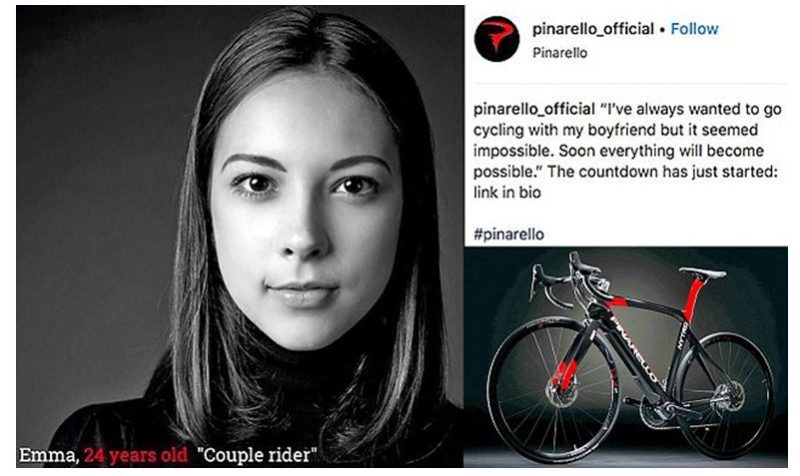
Pinarello has since pulled the ad from various social media outlets, It has issued the predictable “We apologize but don’t really apologize because…” statement normally reserved for politicians and media stars. The whole kerfuffle was gleefully covered in industry and consumer cycling pubs, as well as in large-circ nonendemic media. The race may be largely over, but just like the cow flop, the #PinarellNO stink remains.
So why am I telling you all this when you probably know it already? Because in the PR biz and in marketing in general, it is axiomatic that the reaction has more long-term consequence than the incident itself. And the reaction in the Comments section of BR&IN (scroll down in the link to get to them) generally falls into three categories:
- Readers of both genders expressing outrage and excoriating Pinarello for its blatant sexism.
- Male readers mansplaining to offended women why they have no business being offended because there’s totally nothing to be offended by.
- Readers either attacking or defending BR&IN’s publication of the press release in the first place (about 50-50). For the record, Selene Yeager is among the supporters. I am not.
Let’s deal with these points in reverse order.
Decision to publish: Bicycle Retailer editor Lynette Carpiet defended the decision, saying in part, “Bicycle Retailer & Industry News does not support or condone sexist marketing. But we do write and include how a company is marketing a product. To censor their language out would be to inaccurately portray their philosophy or viewpoints.”
I can’t fault Bicycle Retailer for printing relevant press releases. It’s part of the business of running a trade magazine. New products or events are items of interest to the industry, and are therefore news. But much as I like and respect her, Carpiet’s position is built on an undeniably slippery slope. By the logic in publishing Pinarello’s misogynistic press release, it might also run press releases advocating racist, anti-Semitic, homophobic, or even outright criminal positions. As long as it’s about bicycles, of course, and as long as it pertains to “how a company is marketing a product,” it fits the publisher’s standards.
And therein lies a second, thornier problem. If Bicycle Retailer recognized the release’s sexism, as it claims, and it “does not support or condone sexist marketing,” as it claims, why didn’t it publish a disclaimer to that effect before the cow flop hit the fan?
Mansplaining. I should note that a portion of BR&IN readership is civilian; e.g., people not part of the bicycle industry. So it’s hard to know which comments were made by whom. But in my experience (and more importantly, in the experience of literally every industry woman I’ve ever spoken to) these comments exemplify industry attitudes.
Despite making more women-friendly products (like e-bikes for women who can’t keep up with their boyfriends), we as an industry are still full of sexism that drives women away from cycling (like e-bikes for women who can’t keep up with their boyfriends). You see where I’m going with this.
It’s deeply ingrained at every level of the supply chain, and a big piece of it is an industry that all too often dismisses what our female customers (and prospective customers) are telling us. Not about products, necessarily, but about the whole culture of riding bikes.
In the present case, one way the mansplainers dodge this issue is by claiming the ad is solely about whether the average man rides faster than average woman, and that women should “just get over it.” But that’s not what it’s about. Not even close.
As women (and increasingly men, as we will see) are saying loudly and clearly and repeatedly, it’s a matter of attitude and message and presentation. It’s about how women are addressed and the assumptions that underlie the messages. When the mansplaining crowd avoids the real issue by telling women that the real issue they’re upset about isn’t the real issue, it’s a classic example of not listening. And for men in our culture—and I include myself, at least more often than makes me comfortable—a big part of not listening is denying we’re not listening.
Both Genders. Here’s the ray of sunshine in this otherwise gloomy picture. Women and now men are standing up against industry sexism in unprecedented numbers. And about time, too.
Back in 2015, Colnago ran a couple of overtly sexist eye-candy-cum-sexual-double-entendre ads. There was some outrage on social media, but it was non-news as far as the industry was concerned. To be sure, there was significant pushback. But instead of a tepid apology, Colnago responded with an almost literal vaffanculo. As Bicycling’s Joe Lindsay put it, “To make matters worse, Colnago appears to have doubled down on its strategy, with Buzzfeed reporting that Colnago began blocking people on Facebook who criticized the post.”(link added)
To set the record straight, eventually Colnago did a flipflop and issued an effusive apology. But sincere? Who knows.
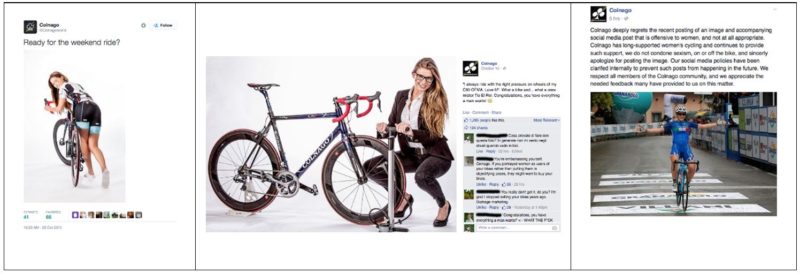
But that was then. And this undeniably is now. Maybe it’s the changing times. Maybe it’s a critical mass of women in the industry who aren’t afraid to call shenanigans anymore. Maybe it’s their leadership influencing coworkers and riding buddies. Maybe it’s the #MeToo movement. And maybe it’s something else or a lot of something elses.
None of that really matters at this point. We are an industry in something close to a death spiral of declining ridership a catastrophic shop closure rate. So what should matter is not the why of what’s happening so much as the undeniable fact that it’s happening at all. And that it’s happening now. And hopefully, that there’s no turning back.
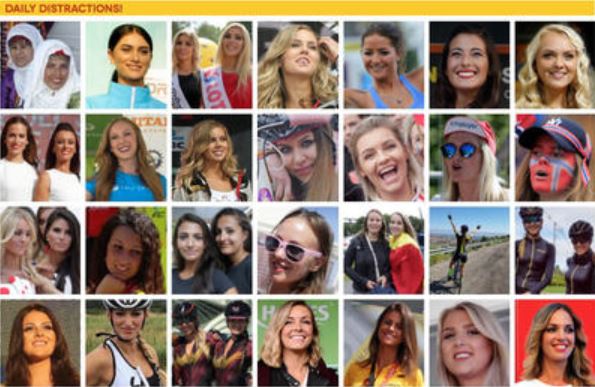 Case in point: in mid-November, Pez Cycling News announced it had eighty-sixed its Beautiful Women gallery (10 Hottest Giro Babes!), formerly known as Daily Distractions. Not in response to social media outrage—that’s been going on for since 2002 with zero effect—but because an advertiser, or at least a potential advertiser, Vittoria. VP of product and marketing Ken Avery collared publisher Richard Pestes at Interbike this year before and had a chat with him.
Case in point: in mid-November, Pez Cycling News announced it had eighty-sixed its Beautiful Women gallery (10 Hottest Giro Babes!), formerly known as Daily Distractions. Not in response to social media outrage—that’s been going on for since 2002 with zero effect—but because an advertiser, or at least a potential advertiser, Vittoria. VP of product and marketing Ken Avery collared publisher Richard Pestes at Interbike this year before and had a chat with him.
“I took the opportunity to ask him why he had that section on his site,” Avery told Bicycling, “and I told him I felt it didn’t represent the strong women I know in cycling,”
No one knows for sure what really went down in that conversation except Pestes and Avery. But an ad budget the size of Vittoria’s swings a pretty heavy bat with the cycling media. Whatever happened, the net-net on that meeting is that Pez has been tearing the offending galleries from its web pages ever since. Once again it was non-news as far as the industry was concerned, but once again Bicycling found it newsworthy.
So maybe the times really are changing, and in terms of the health of the industry, not a moment too soon. As Selene Yeager put it in our phone conversation (right after the exploding-head part), “But the industry is improving rapidly—it’s different place than it was five years ago. I think it absolutely is. And I noticed a lot of men saying (about the Pinarello ad) “this is not right.” So there has been progress.”
Finally, as former pro racer Kathryn Bertine tweeted recently, “I’ve always wanted to see more men, women & the Internet stand together and smack down sexist marketing, but it seemed impossible. Now everything is possible. Thanks #PinarellNO.
Amen to that.

